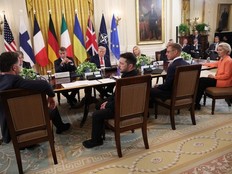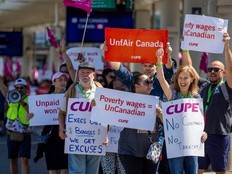Q&A: Eric Bischoff talks WCW, the NWO, John Cena, his hall of fame induction and more

Article content
He’s one of the most polarizing, tell-it-like-it-is personalities ever associated with the world of professional wrestling.
He’s also the former executive producer and senior vice-president for World Championship Wrestling, a man who has been credited with nearly single-handedly taking down World Wrestling Entertainment during wrestling’s Monday Night War in the 1990s and early 2000s. He’s the former general manager of Monday Night Raw and a WWE Hall of Famer. He also hosts the popular 83 Weeks podcast with Conrad Thompson.
So, when Eric Bischoff speaks, people tend to listen.
In an exclusive Q&A with Postmedia, via CanadaCasino.ca, Bischoff spoke about the state of wrestling, his place in its history and his thoughts on many subjects:
The state of professional wrestling is arguably never more healthy than it is today. There are more wrestlers working full-time now than ever, more places for them to work. How much do you think yourself and Ted Turner impacted today’s state of wrestling by changing the industry with WCW, guaranteed pay and luring so many big names down and building a true competitor to WWE?
A: WCW Nitro and, yes, Eric Bischoff changed the wrestling business. Now, you’ve heard that term thrown around a lot. Everybody talks to, likes to throw those accolades out every once in a while, but very few people have fundamentally, at its core, legitimately changed the structure and the outcome of the wrestling business.
Vince McMahon was one of them back in the early ’80s when he took professional wrestling from the regional territory system and turned it into a national promotion and now a global promotion, right?
Without question, that is the most, the single most important change in the wrestling business. Until I came along. Until Nitro came on. Because, as I’ve said, we fundamentally, at its core, changed the business by no longer focusing on the teens and preteens and focusing on 18- to 49-year-old men.
I did it because I had no choice. Vince did it because my decision proved to be the right one. He fundamentally changed his business model, created the Attitude Era — all this provocative, male-driven stuff that he did for such a long time — intentionally to grab that 18- to 49-year-old audience.
OK, we’ve talked about that enough. But now let’s fast forward into 2025 and look at the state of the wrestling business. Wow, it’s really cool, it’s really exploded. But why?
The why is because when I forced Vince McMahon to change the focus of his company and design its product for an 18- to 49-year-old audience, all of a sudden his ratings came up, which enabled him because he was making more money. He took his company public. By taking his company public, he had an amazing amount of capital to work with, which he used to expand his business globally.
And now you look at where they are, but it all comes back down to one fundamental change. In Vince’s case, that took place in late 1997, we led the way in 1995, certainly by 1996, with a more realistic weekly live show.
Vince wasn’t doing live weekly shows before I did. He did it in reaction to what I was doing. So we have — I have, Nitro did, WCW did, Ted Turner did — created the model that Vince McMahon had to replicate in order to grow his business, and he did. And that’s one of the reasons why the business is as healthy as it is.
Do you think AEW would be able to draw a breath on the Turner Networks had it not been for the success of Nitro? I mean, if you want to say that to make yourself feel better, you can, but it’s not true.
So, I mean, in a kind of a macro perspective is what I did, what we did, what Ted Turner did, because none of it would happen without Ted. So there you go. That’s a long-winded answer.
What is your greatest accomplishment? What are you most proud of in the business from your career?
A: Everything that I just said, you know, when you can fundamentally change the business and force your competitors to do what you’re doing cause you’re kicking their ass every week, I don’t know, that feels pretty cool to me.
Look, I can point to moments, I can point to things that happened in the ring, I can point to things that happen outside of the ring.
Proud? I don’t know that I’m proud of all things. I acknowledge it. I feel good about certain things, some things I don’t feel good about. It’s not a matter of pride necessarily for me, it’s just I recognize accomplishments for what they are.
If there’s anything, I don’t even want to say proud, it’s what I’m grateful for, because there’s a difference, is that I still go to conventions around the country and in some cases around the world making wrestling appearances. And the thing that I’m most grateful for is listening to the stories of people who come, spend money, spend time, and they come because they want to meet me.
But what they really want to do is tell me how professional wrestling affected their lives, and when I hear them, every single time I make an appearance, more than once, sometimes all day, I’ll hear stories about, yeah, I remember, you know, Nitro, you know, I was the only time my dad and I got to spend together was watching Nitro because he worked nights, you know, six nights a week and I was in school, but Monday nights were our night together. And my dad’s no longer here, but every time I see Nitro on a streaming platform, or whatever, or when I see you standing here, Eric, it reminds me of my dad.
That’s important stuff because people are connecting an important part of their lives, and in relationships and they’re connecting it to something that I was doing on television. And at the time I was doing it on television, I didn’t think about any of that. I wasn’t thinking about, wow, I wonder how this program is going to affect people. I wonder how this program is going to bring people together.
I never thought about that, but now I hear about it every time I go to meet people, and sometimes it makes me cry. It’s the stories that are so touching.
I could tell you a story about a young lady in her mid-twenties that stood up at a Comic-Con that I was moderating with Sting, doing a Q&A. This lady stood up and said, ‘Eric, you know, I really just came to see you and I just want to tell you a story about my dad.’
She did, and both her mother and father had passed. She was an only child. She didn’t have any siblings, but her dad was a huge Nitro fan. Fast forward, about two months later, this young lady finds my wife. My wife was a little easier to find, I guess, than I was. She finds my wife, sends my wife an email, telling her whole story about her dad and Nitro and da-da-da-da and I’ve told this story 100 times and I start to cry every time.
She told my wife, she said, ‘I’m getting married. I don’t have anybody to give me away. My dad was a huge NWO fan. Do you think maybe …’
My wife’s reading me this email. I said, ‘Well, where does she live? My wife told me where she lives, you know, it’s 1,000 miles from here. So I thought, ‘Well, I can drive that. That’s no big deal.’ I jump in the truck, grab the dog, take a nice little road trip, turn on some tunes, and go walk this young lady down the aisle. And I did, and she’s become a family friend as a result.
Those stories matter to me. The silly shit I did on TV, not so much, but the connection to the audience did and and does.
Who are some of the talents today whom you could have wished you could have worked with back in the day?
A: Well, they all could have, I guess my favourite performer today is Randy Orton.
Now, Randy Orton broke into WWE about the same time I came in as the general manager. So Randy’s been around for a long time. He’s certainly not a young new talent.
But I think he’s the best of the best of the best of our generation, my generation. He’s right up there with Shawn Michaels, in my opinion.
I think in some respects, it’s just a matter of taste, but I prefer Randy’s approach to the product a little more than I appreciated Shawn’s.
Shawn Michaels is without question one of the best, if not the best, because the things I like about Randy are subjective and I perhaps value them more than others do, but Randy to me looks effortless. Randy is so smooth. He makes everything look so easy.
It’s like he can wrestle in an intense 60-minute match and actually appear as if it’s almost effortless. It’s that smooth. His ability to sell is the way he uses his look, the way he uses his body to tell a story. I think he’s the best of the best.
Shawn, I think, was more dynamic and could, you know, he’s a smaller guy, smaller guys can do faster things. It’s just as in any sport, it is what it is. You know, it’s the difference between watching a world heavyweight boxing match and a world flyweight boxing match. You get a lot more action with the flyweights.
But there’s something special about Randy Orton to me, and I would have loved to work with him because he’s such a special character.
How do you compare the kind of the Bloodline storyline with the NWO? Is there a comparison to be made between the two?
A: Yes and no. Let’s first talk about Bloodline.
I think the Bloodline storyline is, without question, the best storyline in professional wrestling. Maybe ever.
From a storytelling point of view, from a disciplined, storied structure, execution point of view, it blows the NWO story away.
In that regard, blows it away, there is no comparison.
However, I think the NWO storyline, for a variety of reasons, it will always be recognized as one of the most impactful, if not the most impactful storyline in the history of the business, because it changed everything, going back to what I talked about earlier, forcing WWE to change their business model. The NWO, and that storyline, were largely responsible for that.
So in that respect, I think the NWO blows the end of the bloodline storyline away. I don’t think any storyline will have as significant an impact on the industry overall as the NWO storyline.
However, if you put those two storylines together, word for word, week for week, month for month, Bloodline blows it away.
John Cena’s heel turn in comparison to Hogan, Hollywood Hogan’s turn, is there a comparison to be made there again, or how do you assess those two stacked up side by side?
A: There are parallels. Hulk Hogan was a babyface forever and on top of the babyface food chain. When he turned heel, it was shocking.
Cena, babyface, top of the food chain, 20 years or whatever it’s been — 18, I don’t even know who keeps track after five, just your accountant and your banker.
I think John’s turn, and I just watched the interview he did Monday night with Cody Rhodes — phenomenal piece of work, great television.
But I just don’t think it’ll have the impact of a Hogan turn for the same reasons I talked about with the NWO.
You know, Hogan was uniquely positioned to shock the wrestling world. I don’t think people were quite as shocked at Cena’s turn, partly because there was discussion about it. There was anticipation. You think he will? Is he gonna turn this year? No, he’ll never turn, this is his last run. Yeah, maybe he will.
So there was already a little bit of speculation about it, so it didn’t have the impact I think, that Hulk’s turn did. Then again, a lot of it is timing; 1996 was a different world than 2025.
In 1996, you were able to herd, like sheep, all of the wrestling fans into this pen called television, because there were no little pens off to the side, there was no Internet, there was no streaming, so you could force the audience into one singular moment. And the result of that is that moment reverberated outside of the business in a much bigger way.
Not virally like we would do it today, but it was like the Big Bang, and you could hear the echo of that bang. People were like ‘Whoa, what was that? Where did that come from? Let’s go find that.’ And they did.
So it’s just two different worlds, two different situations, some parallels, but not many.
Who had the more difficult job to get over as a heel? Hogan then, or Cena now?
A: I think Cena now. Hulk turning heel shocked people. Cena turning heel is entertaining people.
Shock created real heat. The heat that we’re getting now, it’s valuable. Don’t get me wrong, it’s not fake. It’s not cheap heat. It’s good heat, but it’s not the same heat as when Hogan did it.
When Hogan did it, I was there, obviously. There were men that were so mad they had tears in their eyes. They were heartbroken. They had tears in their eyes, they were so pissed off. I mean there was real heat.
I often describe heat in two different ways. One is like they really, really want to see you get your ass kicked, and the other is Pavlovian. Because the audience understands that they’re part of the show. And even though they’re not given a script, they know their role. And they know when to speak up, and when not to, and how to speak up.
So, you’re getting a great heel reaction, and I think too large to some degree, it’s real, but it’s not the same kind of heat as when Hogan turned heel.
People felt betrayed when Hogan turned heel. People are interested in seeing Cena turning heel. That’s the difference.
Is it betrayal or interest? You’re gonna get a different level of heat between those two.
Your induction into the WWE, given your fame and role as a rival, how did it feel?
A: You know, it’s funny because for years leading up to it, every time WrestleMania came around, every time the Hall of Fame rolled around, it’s like, ‘Oh, Eric, do you think you’re gonna get in this year? How come you’re not in yet?’
I think maybe because I’m human, you know, I have, I have pride and ego. I try to keep it in a healthy condition and not let it get out of hand, but it is, it’s there. And after a while, I was kind of like, in my own mind, just maybe kind of as a defence mechanism, I say, yeah, if I do, I do, if I don’t, I don’t, you know.
But deep down, I was like, ‘Man, what’s a guy gotta do to get into the Hall of Fame here?’ And so, when a call came, it was satisfying and meaningful in a couple of different ways.
Ironically, because I had just been let go from WWE. I went back to work. I reported to Vince McMahon. I worked for Vince for four months, and the chemistry was just not there, to be honest. My fault, not his. I didn’t adapt. I could have. I had the opportunity, and I chose not to. So, yeah, it is what it is, but I still maintain a good relationship.
Vince and I talked after and I was like no big deal, you know, just some things work out, some things don’t. It’s OK, it’s no harm, no foul. Learn.
But still, to get that call, because Vince would have had to approve it, to get that call from WWE literally whatever it was, six months or months after I’ve been let go, that was kind of cool.
And then when it happened, It really dawned on me when I was there. It’s like this, this is a hell of an accomplishment, you know, some people dismissed the hall of fame as, you know, doesn’t really mean anything, there’s no physical building. Silly shit, but when you’re acknowledged by your peers, I thought about when I was walking up to the podium to give my speech, I’m thinking look at all of the names of people that are in this hall of fame before me. To be even in the same mental zip code, postal code as some of those names, it’s like, wow. It’s kind of a big deal and I’m just grateful for it.
Jan Murphy is the editor-in-chief of The Kingston Whig-Standard, a longtime professional wrestling journalist and NWO for life.











Postmedia is committed to maintaining a lively but civil forum for discussion. Please keep comments relevant and respectful. Comments may take up to an hour to appear on the site. You will receive an email if there is a reply to your comment, an update to a thread you follow or if a user you follow comments. Visit our Community Guidelines for more information.